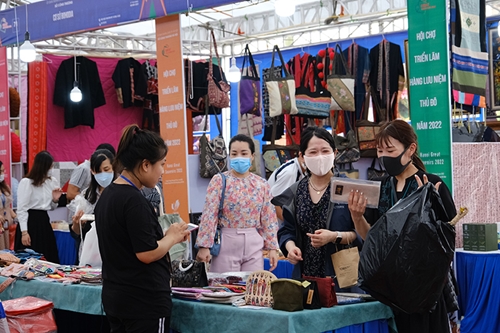    |
 |
|
At the launch (Photo: baodautu.vn) |
This is an annual activity responding to the campaign “Vietnamese prioritize using Vietnamese goods” launched by the Party Central Committee’s Politburo, aiming to encourage domestic enterprises to produce quality products and build brands for locally-made goods.
The voting program is also aimed at promoting the connections between demand and supply, as well as between consumers and enterprises, thus further enhancing the position of local products on the domestic market.
At the launch on July 28, Tran Thi Phuong Lan, Acting Director of the department, said after many editions, the municipal steering committee for the program has continuously expanded the scope of participants and adjusted the methods of voting with a view to ensuring easy access and impartial assessment of the voting.
Goods subject to consumers’ voting cover products and services produced and provided by legally-registered enterprises and cooperatives based not only in Hanoi but also other provinces and cities across the country.
Products should be from the sectors of industry; fashion-accessories; construction–interior furnishings; pharmaceutical products; household chemicals-cosmetics; stationaries-learning equipment; handicrafts and fine art articles; agro-forestry-fishery products; OCOP (One Commune One Product) goods; and food. banking services; tourism; media; and transport; among others.
The target services are those in finance, banking, insurance, payment, e-commerce; tourism, dining; education, training; telecoms, informatics; transport, logistics; communications and event organization.
The voting will be held from now through October.
    |
 |
|
Customers love traditional products of Hanoi. (Photo: baodautu.vn) |
Winning goods will receive a certificate and be featured on Hanoi’s trade promotion publications, while their producers can use the “consumers’ most-favored Vietnamese product” title for them in their advertisements.
Last year, 213 products and services of 150 businesses in Hanoi were chosen as the favorite Vietnamese products by customers.
The campaign “Vietnamese prioritize using Vietnamese goods” was launched by the Politburo in 2009 to promote patriotism and foster the production of made-in-Vietnam commodities which have high quality and competitiveness, helping to meet demand for domestic consumption and export.
Many activities have been held across the country over the past years in response to the campaign. The campaign has produced positive results, contributing to curbing inflation, stabilizing the macro-economy and ensuring supply-demand balance. It also has helped changed domestic consumers and businesses’ awareness of domestic-made products.
Vietnamese commodities have made up 90% of goods sold in retail outlets owned by domestic enterprises and 60-96% of foreign supermarkets in Vietnam, according to the Ministry of Industry and Trade (MoIT), showing that more Vietnamese consumers are choosing Vietnamese goods.
In traditional retail channels, the ratio of Vietnamese goods in markets and groceries is at least 60%. Particularly, since COVID-19 broke out, 76% of Vietnamese consumers tend to prioritize domestic products, especially those with guaranteed quality and health benefits.
In association with the “Vietnamese people prioritize Vietnamese goods” campaign for the 2021-2025 period, the Prime Minister issued Decision 386/QD-TTg on March 17, 2021, to approve a project on developing the domestic market.
This project looks to maintain the percentage of strong Vietnamese goods at over 85% in modern distribution channels and over 80 percent in traditional ones such as markets and grocery stores.
To develop the domestic market and sustain the stake of Vietnamese goods in distribution channels, it devised four groups of main solutions and policies: assisting the development of stable and sustainable distribution systems for Vietnamese goods; building national programs linking manufacturers and traders with local distributors and outlets; helping businesses access capital sources to upgrade technology, improve product quality, and reduce production costs; and boosting market surveillance and consumer protection.
Source: VNA